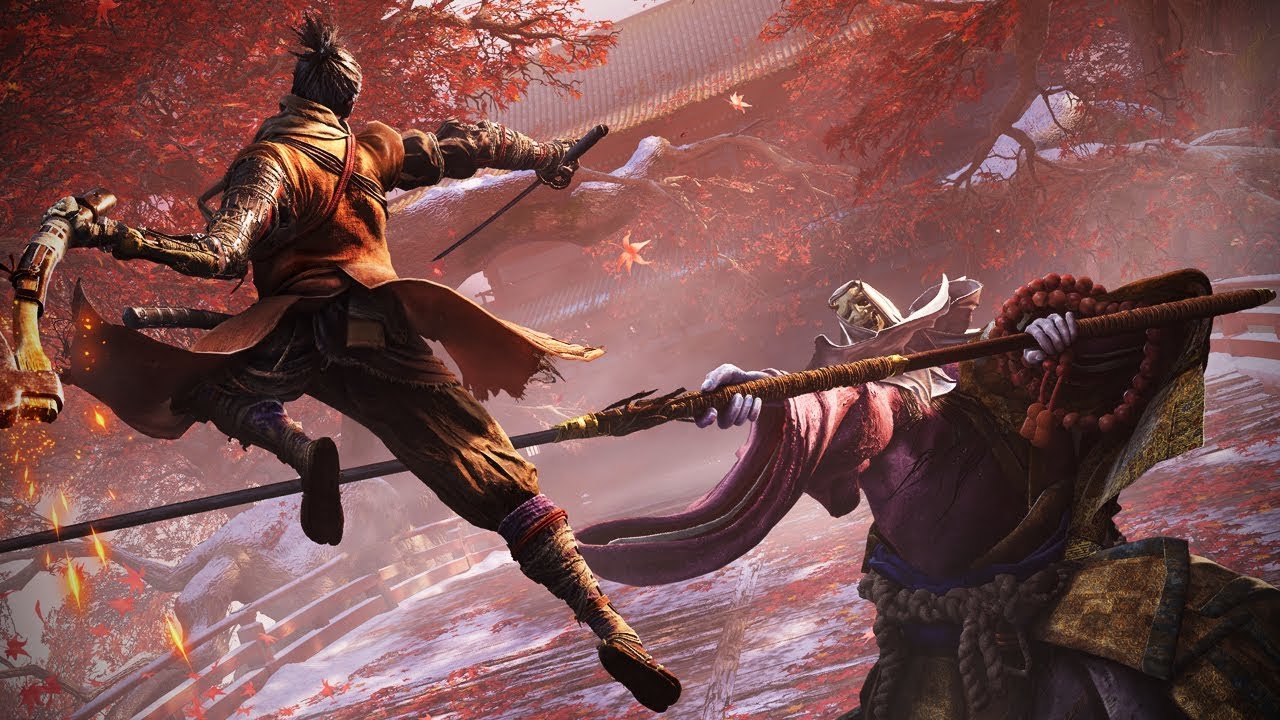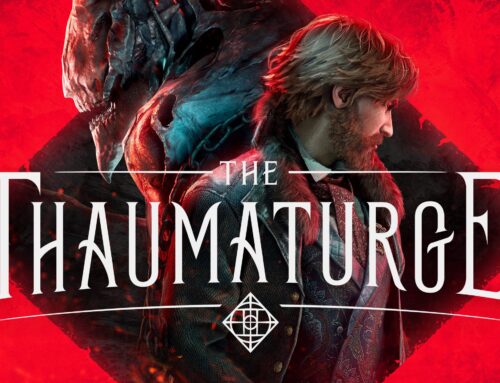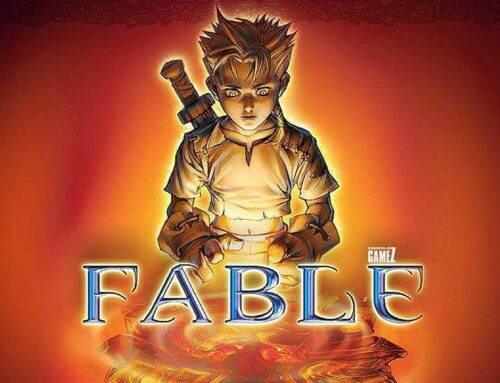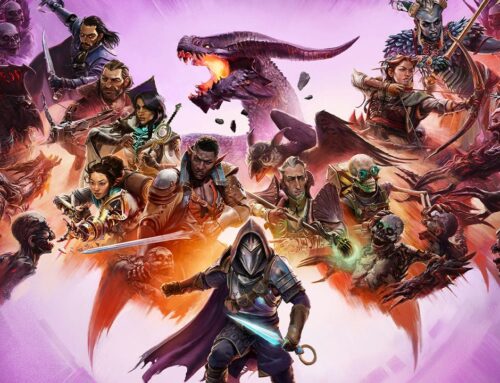With the release of From Software’s Elden Ring looming on the horizon, it’s time to reopen the tired old video game difficulty debate. I’m sorry. I really am. But it’s time. Why? Because I haven’t contributed to it thus far, and I want to. Badly. (oh, and in case you want to see me beat another dead horse, read this article on open worlds)
So, here’s my position – games like Elden Ring, Dark Souls and other so-called “soulslikes” should have an easy mode. Yep, I said it. Now breathe deeply. In and out, in and out. Just like that. Now pour yourself a glass of rosé, take a bubble bath and relax. It’s okay. Life is good.
The key word here is “should,” not “must.” As in, it would be nice to have. Although, perhaps, “easy mode” isn’t even the right term, since what I’m advocating for is not an easy mode per se, but a series of features or tools that enable players to complete games (difficult or not) without much struggle. These features/tools can be your traditional easy mode/difficulty adjuster, or they can be a set of accessibility options or cheats. Think of them as a fast-forward button on a remote, or the ability to flip to the end of a book without reading it. Something like that.
Because, at the end of the day, many players don’t have the time, skill or patience to finish video games, even when they want to. Difficulty isn’t everything, and there are other reasons to enjoy games, such as atmosphere, story, level design, gameplay, you name it. Soulslikes, particularly those from From Software, excel in many categories, yet few people can experience their games fully. An easy mode (or equivalent) would fix that.
Personally, I love the Dark Souls trilogy and Bloodborne. I have completed all four. Despite this, I do often wish there was an option to make them a bit easier, so I can re-experience their beautiful worlds in a less stressful manner. (speaking of which – apparently, Elden Ring aims to be less stressful without sacrificing its difficulty, which is a great step forward)
Plenty of YouTubers and bloggers have argued against adding an easy mode to soulslikes and other difficult games, but few have done so effectively, as far as I’m concerned. Nevertheless, there are some who have argued eloquently and respectfully – namely Eyebrow Cinema in his “Dark Souls Difficulty and the Easy Mode Debate” video, and Darkfry in a video titled “Designing Dark Souls Easy Mode” (he makes compelling cases for both sides of the debate). You should definitely check them out.
With that in mind, I would like to tackle some of their key arguments one by one, and in the process, explain why making soulslikes (and other less approachable games) easier would be a great idea. So, let’s dive in:
Argument #1: Why Pick on Dark Souls Specifically?
In the video, Eyebrow Cinema calls the Dark Souls difficulty debate a “micro-issue,” because in the grand scheme of things, it’s not a widespread problem. Most games do, in fact, have difficulty adjusters, and on average, most tend to be much easier than Dark Souls and its brethren. He points out that even certain soulslikes, such as Star Wars Jedi: Fallen Order, have difficulty adjusters.
Furthermore, the debate generally seems to target one specific developer – From Software – and one specific franchise – the Souls franchise, which includes the Dark Souls trilogy, Demon’s Souls and adjacent titles like Bloodborne, Sekiro: Shadows Die Twice, and soon, Elden Ring.
The main point is that the media seems to arbitrarily pick on From Software, despite their products catering to a relatively niche audience and not being indicative of wider industry trends.
Rebuttal: Dark Souls is Just a Popular Example, Nothing More
I agree with Eyebrow Cinema, to an extent – the media does seem to target From Software in this discourse more so than any other developer. However, From Software’s games are some of the most popular “difficult” games on the market, and thus, they are the easiest example to point to. But I think the discourse needs to be larger than that. All games should have difficulty options, not just Dark Souls.
Eyebrow Cinema posits that most modern games have difficulty options and that Dark Souls is for the most part an outlier. To see if this is true, I decided to check out some of the major releases from 2021. Here’s the list I came up with, along with the difficulty options these games offer (it’s not comprehensive, but it does paint a clear picture):
- Halo Infinite | Four difficulty options: Easy, Normal, Heroic and Legendary.
- Resident Evil Village | Three difficulty options: Casual, Standard and Hardcore.
- Hitman 3 | Three difficulty options: Casual, Professional and Master.
- Psychonauts 2 | No difficulty options, but it does have “assist” options, like No Fall Damage, Invincibility and Narrative Combat.
- It Takes Two | No difficulty options (though the game does seem to be very forgiving).
- Metroid Dread | No difficulty options.
- Ratchet & Clank: Rift Apart | Four difficulty options: Rookie Recruit, Rebel Agent, Resistance Leader and Renegade Legend.
- Monster Hunter Rise | No difficulty options.
- Marvel’s Guardians of the Galaxy | Three pre-set difficulty options: Easy, Intended and Hard, plus a Custom difficulty option.
- Far Cry 6 | Two difficulty options: Story Mode and Action Mode.
- Returnal | No difficulty options.
- Tales of Arise | Five difficulty options: Story, Normal, Moderate Hard and Chaos.
- Kena: Bridge of Spirits | Four difficulty options: Story Mode, Spirit Guide, Expert Spirit Guide and Master Spirit Guide.
So, yes, most major titles do indeed have difficulty options, and only a handful of them don’t, such as Returnal, Metroid Dread and Monster Hunter Rise. All three are considered “tough” or “toughish” by the gaming community and have prompted discussions about difficulty, as evidenced in this Game Rant article about Returnal and this Reddit thread on Metroid Dread. This means that From Software isn’t necessarily an outlier, but it is indeed a “micro-issue.” At least, today.
However, if you dial the clock back a little and look at the big picture – one that encompasses all video games throughout history, or at least, the ones released in the last 30 years (from 1990 to 2022) – it suddenly isn’t a micro-issue anymore. The fact is, most video games that exist are difficult. Too difficult for most people. Sure, they’ve become easier and more approachable over the years, but it’s been an incredibly gradual process. Uncharted (released in 2007 on the PlayStation 3) and Gears of War (released in 2006 on the Xbox 360), for example, can be frustrating experiences, even on easy mode (try beating RAAM in Gears without a co-op partner, and you’ll see).
I would go on and argue that modern games that are not considered “difficult” are still difficult for many people, or non-gamers, if you will. For example, I’ve recently attempted playing Borderlands 3 with my father, who’s been very enthusiastic about its gameplay and cartoony aesthetic, but he simply couldn’t keep up, and dying nonstop discouraged him from continuing on or trying the game on his own. Since Borderlands 3 doesn’t have enough options to make the game manageable, he decided to stop playing it. Now, I personally have gotten through Borderlands 3 and have seen its (lackluster) narrative through to the end, but my father hasn’t. Because he couldn’t get there.
Some may say, he should’ve tried harder. Maybe. But also, trying harder can lead to stress, as evidenced by this study. Given his age, I would prefer him not to put himself through that.
Now, I’m not trying to play on anyone’s sympathies here, but I do want to make it clear: most video games are hard, especially for those who play them rarely, and soulslikes are even harder. I think difficulty, and the fear of not being able to complete a game is a huge barrier to entry for many newcomers.
Adding difficulty adjusters (or equivalent) to games like Dark Souls (or all games, in fact) would assuage such fears and encourage more people to get into them (and complete them).
The adjustments in Marvel’s Guardians of the Galaxy are a great example of what I’m talking about, as seen here:
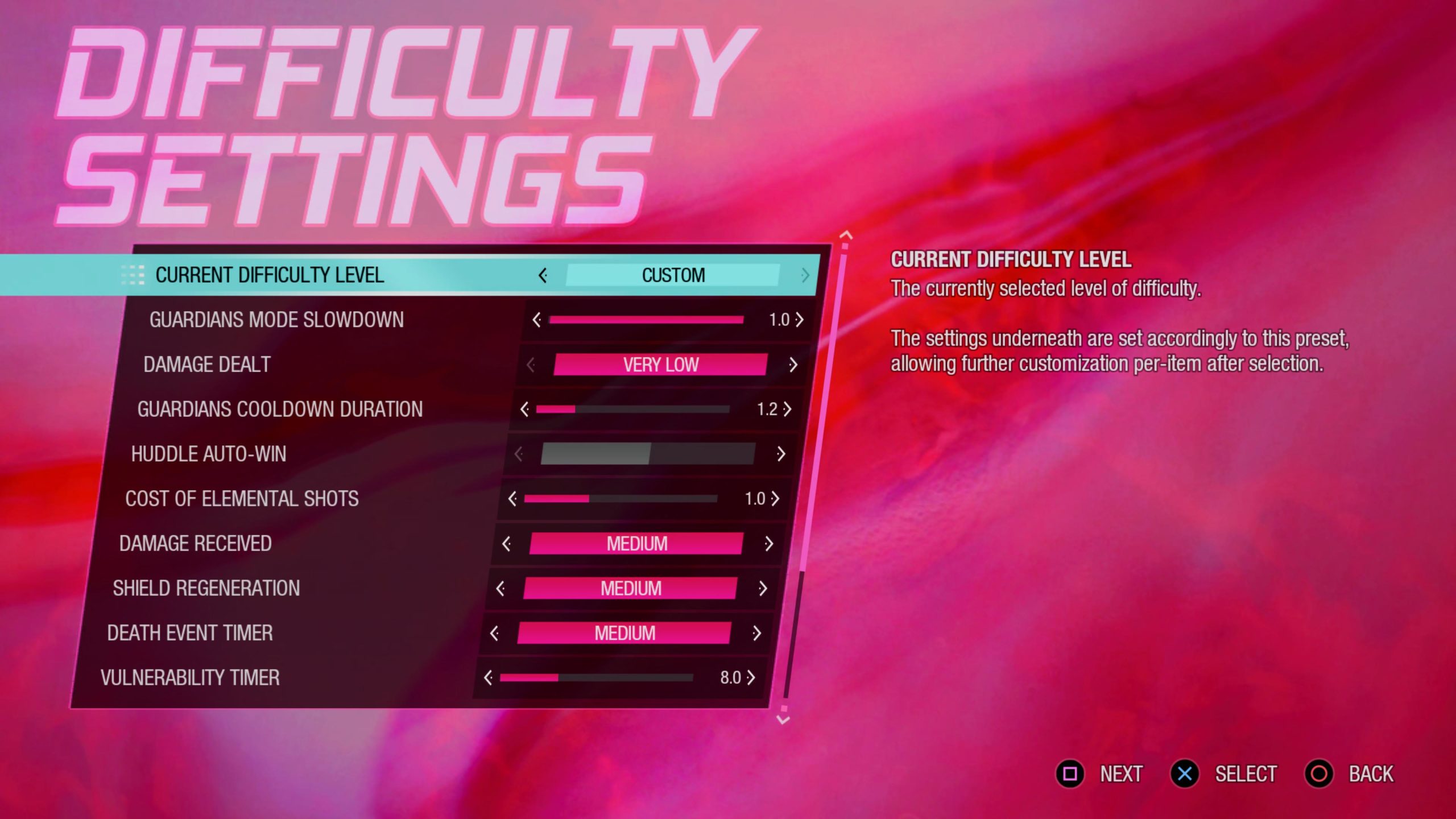
Same goes for the difficulty options found in Psychonauts 2:
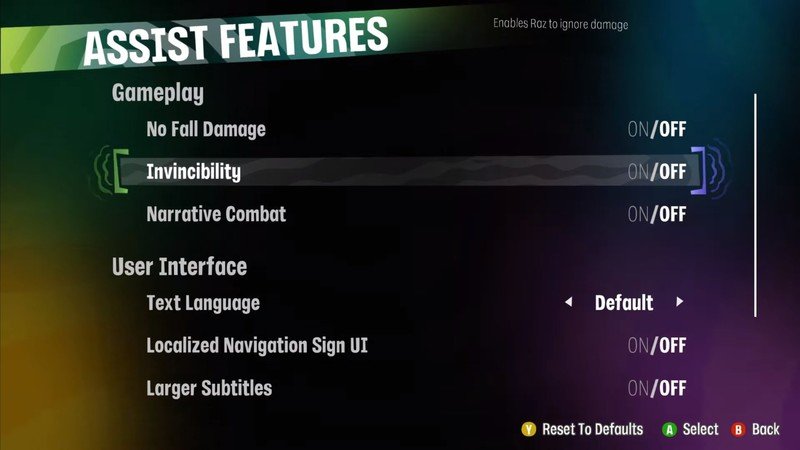
And in Control Ultimate Edition:

Whether you call the above, a “difficulty setting,” “assist mode” or “cheats,” I think such options should be made available across all games to make the medium more inviting as a whole.
Finally, Dark Souls are all terrific games, and though their difficulty is certainly a big part of their appeal, there’s much, much more to them than that, such as their atmosphere, level design, lore and combat. Saying otherwise is underselling them.
That’s another reason so many of us are picking on Dark Souls. These games are fantastic, and it’s a shame that many people can’t experience them at least to some degree (watching YouTube playthroughs doesn’t count).
Argument #2: Easy Mode Won’t Quell All Frustrations
The next big argument Eyebrow Cinema makes is the idea that an easy mode may not make games like Dark Souls easier.
He points out that most difficulty options mainly regulate damage – the damage received by the player and the damage dealt by the player against enemies. However, damage isn’t everything in Dark Souls. Rhythm and pacing also play a role in combat. It’s all about paying attention to different attacks and responding in kind. So, even if the player were to deal more damage and receive less, combat may still be frustrating.
On top of combat, there’s also navigation, which can be as difficult as combat in Dark Souls, Eyebrow Cinema argues. There are no quest markers, no map, no compass, no traditional quests and no direction as to where to go at all. Again, changing difficulty, which in most cases regulates damage, wouldn’t solve this problem.
Rebuttal: Sure, But These Frustrations Can Be Solved by Other Means
All right, so, Eyebrow Cinema is obviously referencing this Forbes article, in which Dave Thier posits that damage sliders is all Dark Souls needs to be easier. Given the narrow scope of Thier’s argument, it’s not difficult to point out why he is wrong, and Eyebrow Cinema does a good job of that.
However, this doesn’t mean that Dark Souls can’t be made easier. I mean, Star Wars Jedi: Fallen Order has difficulty options, and its easy mode does work. I’ve tried it for myself and haven’t died once during my entire playthrough. The game even shows you what it adjusts:

Damage is only one parameter. Others are parry timing and enemy aggression. By selecting the lower difficulty, your biggest hurdle in the game becomes exploration, but since falling to your death respawns you close to where you die and you don’t receive any other penalty, even exploration is not that tough (though, perhaps, even there, the game could be more forgiving).
Dark Souls can implement the exact same adjustments, and perhaps, even scold the player for relying on them. They can block achievements, for example, or make these adjustments a (free) downloadable feature to further dissuade the player from using it.
I’ve recently played Nighthawk’s rerelease of Virgin Games’ Aladdin, and in that game (in the rereleased version), you can rewind gameplay at any point. So, if you die, simply rewind to wherever you want and try again. That’s yet another way of making a game less grueling. Again, this option can be tucked away somewhere in Dark Souls, so it’s not readily available – not until the player is ready to give up.
In combination with the options seen in Jedi: Fallen Order and this rewind ability, both combat and navigation could be made significantly easier.
I would also add that one of the biggest reasons Dark Souls’ navigation is tough is because of how often you die at the hands of various foes. By focusing less on the difficult enemies and more on the environment itself, the player wouldn’t feel as overwhelmed by their surroundings. Again, Jedi: Fallen Order is a breeze on the lowest difficulty, even though its level design is very similar to that of Dark Souls (though, admittedly, it does have a map, unlike Dark Souls).
Argument #3: From Software Already Tweaks Its Difficulty
Another defense of the Dark Souls difficulty that Eyebrow Cinema provides is the notion that From Software is already making its games easier, and he lists some of them in the video. Here they are:
- Bigger and more forgiving environments. Environments in Dark Souls and its predecessor, Demon’s Souls, contain many hidden traps and chasms, as well as narrow passages and walkways that make it easy for the player to get killed by enemies or fall to their death. From Software has fixed this by removing many such inconveniences and widening their environments, particularly in Bloodborne and its successors.
- Shorter boss runups. Runups to bosses in Demon’s Souls and Dark Souls can be as arduous (if not more) as the bosses themselves. Over time, From Software has reduced these runups via shortcuts and other tools, with Sekiro (their latest outing) having the shortest boss runups.
- Checkpoint warping. There are checkpoints in Demon’s Souls and the original Demon’s Souls, but the player cannot warp between them, meaning that they have to walk instead, which makes getting around both frustrating and time-consuming. Later From Software games, such as Bloodborne, don’t have this issue.
- Co-op mode. From Software’s Souls games and Bloodborne all allow the player to summon an online co-op partner to help them with bosses and other difficult obstacles, which can make the games considerably easier.
- Levelling system. If the player is unable to overcome a certain area or encounter, they can acquire better items (such as powerful weapons, healing substances, etc.) and level up their character by farming enemies, which constantly respawn throughout the game. This can make the experience easier since enemies can’t level up like the player. In addition, there is magic in Dark Souls, which the community has often called an equivalent of an easy mode.
Eyebrow Cinema admits that Sekiro does not have a co-op mode, unlike its predecessors, nor does it have a levelling system or magic. However, the player can use the internet for guidance by looking up the numerous available wikis, forum threads, walkthroughs and video tutorials. All of these can provide tactics and strategies that the player might not have considered, making the experience easier.
Rebuttal: Soulslikes are Still Crushingly Difficult
While its admirable, and in fact, helpful that From Software has been tweaking its games, none of these fixes or features make their games easier. Or significantly easier, at least. That’s because From makes its games easier in some areas and tougher in others. For example, while Sekiro is arguably easier to navigate than Dark Souls, it has the toughest combat out of all of them, by far (particularly if you’re not good at parrying).
With that said, let’s go over each fix/feature anyway:
- Bigger and more forgiving environments. This does make From’s later games less frustrating to navigate, as there is a much larger margin of error. However, it’s hard to say if this makes them easier, since there are still plenty of ways to die due to environmental hazards. I’d say, the environments have become fairer rather than easier.
- Shorter boss runups. Again, I think this mostly makes these games fairer rather than easier. Doing long boss runups every time you die is not only frustrating, but boring too, particularly if you’ve already mastered the challenge of doing so.
- Checkpoint warping. Same as above.
- Co-op mode. This can make the games easier, yes, but only if you’re able to get anyone to help you. The older these games become, the tougher this will be.
- Levelling system. This can also make the games easier, but only marginally so. Plus, farming is an incredibly time-consuming, and frankly, boring process in these games that can be detrimental to the overall experience.
Now, credit where credit is due – From Software’s games are incredibly well put together in terms of their difficulty. There’s definitely a kind of rhythm to them that, if mastered, can feel very rewarding to the player. And From’s tweaks have only made these games better in terms of what they strive to achieve.
That being said, the “if mastered” bit is important here, because if you can’t get through what these games throw at you, then you won’t experience anything they have to offer. Not the feeling of besting them and not the fascinating worlds hidden away behind their high difficulty walls. The artistry at work in these games is impeccable, and it’s unfortunate that many can’t experience it fully.
Argument #4: Difficulty is Part of Soulslikes’ Appeal (and Artistic Intention)
This is often touted as the biggest reason to preserve the difficulty of soulslikes. It’s all part of their appeal, and artistic intention. Making them easier would cripple them artistically and alienate their core demographic.
The counterargument to this notion is that easy mode has never hurt a game. This position stems from this Kotaku article, and Eyebrow Cinema references it in his video. The article cites Halo for having an intended difficulty in addition to three other difficulty settings. The Heroic setting is the intended one, and the others are there to match the player’s preference. If Halo can do it, Kotaku proposes, then why can’t Dark Souls?
Eyebrow Cinema’s rebuttal to this point is that, unlike Dark Souls, Halo is a power fantasy. The appeal of playing as Master Chief is in being a “badass action hero.” Conversely, the world of Dark Souls is meant to make you feel small – as someone fighting against great odds and barely succeeding. Choosing an easier difficulty would ruin this experience, because the point of these games isn’t to grind the player down, but to push them to “achieve more than they thought possible.” It’s catharsis through self-improvement.
He adds that while Halo has its difficulty options, it limits the player in other ways. For instance, the player can carry only two weapons at a time, which allows the developer to deliver a specific experience, depending on the weapons doled out in each level or sequence.
The bottom line is that removing the difficulty from the Dark Souls games would sacrifice what makes them special. Eyebrow Cinema compares this to other art forms. In cinema, for example, this would be akin to removing the body horror from a David Cronenberg film. In music, it’s like saying that Rob Halford’s vocal range would be more appreciated “if not for the piercing heavy metal anthems.” Returning to film, he says Seven Samurai could entice more people if it wasn’t “three and a half hours long, subtitled and in black and white.”
The crux here is that if the Dark Souls games are not for you, then don’t play them, and it’s okay not to play them. The aforementioned YouTuber, Darkfry, shares this sentiment, stating that soulslikes are made with a specific audience in mind, and that they are not for everyone. Developers are allowed to have their vision without any compromises.
Rebuttal: Difficulty is Not All There is to Soulslikes
All right, so, I’m all for artistic intention and preserving it at all costs. However, as someone who creates art, I personally would never want my intention to stand in the way of someone experiencing it. I would love to remove as many barriers as possible. And difficulty is a barrier in video games. It’s such a steep barrier in soulslikes in particular that many players can’t even get past the beginning.
Let’s get back to Darkfry’s video for a moment. He brings up Patrick Jagoda’s paper “On Difficulty in Video Games: Mechanics, Interpretation, Affect,” in which video game difficulty is divided into the following three categories:
- Interpretive. When it’s difficult to fully grasp a work of art due to abstract or complex themes, imagery and/or ideas. Video games, movies, books and poems can all be “interpretively” difficult.
- Affective. When it’s difficult to process a work of art on an emotional and/or mental level. Again, video games, movies, books and poems can all be difficult in this regard.
- Mechanical. When it’s difficult to experience a work of art due to the mechanical skill and/or knowledge level required. This mainly applies to video games.
As Darkfry correctly posits, what we’re discussing in most cases when talking about difficulty in video games is the mechanical kind, not interpretive or affective.
I’m bringing these up because by saying that Seven Samurai is not for everyone because it’s long, subtitled and in black and white, Eyebrow Cinema is, in a sense, calling the film “difficult.” However, its difficulty in this scenario is affective, not mechanical, because the barriers to watching it are mostly mental and emotional. They have nothing to do with the viewer’s ability to consume films in general. On the other hand, if the same viewer were asked to watch the film without blinking, then that would be more akin to the difficulty of Dark Souls (I’m being a bit hyperbolic here, but the point still stands).
Dark Souls is a bleak, horror-themed experience with minimalist storytelling. If someone doesn’t like any of these, then the game likely won’t appeal to them. However, what if this someone does like all of three of these and decides to try out Dark Souls? What if they love horror and also love games with minimalist storytelling? Then Dark Souls would appeal to them on that level – at least, on paper.
But then they start playing it. They like the atmosphere, the graphics and the way it plays, yet they are unable to get through the starting area, despite many attempts. That’s where the mechanical difficulty kicks in. And so, despite enjoying the other aspects of the game, they drop it because they can’t overcome the difficulty (due to the lack of patience, or time, or whatever – it doesn’t matter).
That’s where I think the game should fight to preserve the player’s attention – because there’s so much more to it than that opening area.
I don’t buy that the feeling of overcoming the odds would be lost by providing some kind of assistance to the player. I played Control when it first came out, and while it was challenging in spots, I made it to the end. When I replayed it recently on my new PlayStation 5, however, I did “cheat” a little because I wanted to experience the game’s characters and world again, but without the stress of having to “git gud” again. I still enjoyed it as much as the first time, even though the experience was less intense. The overall vision, after all, was still there. Fully preserved. The feel of the game didn’t suffer as a result of my transgression.
But let’s look at more games, such as Dead Space, Resident Evil, Silent Hill and similar experiences. The sense of terror in these games is there even when played on easier difficulties. I don’t think you’re meant to feel like a “badass action hero” in any of them (except maybe Resident Evil 5 and 6), and as a player, I don’t when playing these games. Going back to movies – when you watch a horror flick, all you do is sit there with your eyes peeled. That’s it. You don’t even interact with the thing. Yet, you can still be scared or disgusted by it. It’s the same with games, except there’s also interactivity.
In the case of Dark Souls and its cousins, this also holds true. The atmosphere of despair, of hopelessness, will not go away simply because the games are made easier. And again, when I say “made easier,” I mean that the games can have an option (an actively discouraged one) that the player can rely on if all hope is lost in terms of progressing further. I don’t see why such an option cannot exist in one form or another. When you read a book, and you don’t understand a passage or a word, you can just skip it and come back to it later. In games, you can’t skip anything. You have to suffer through it all, and to me, that sucks.
In Conclusion: The “Entitlement” of It All
When people ask for an easy mode, one thing that comes up often as a retort is the idea of entitlement. As in, you shouldn’t tell developers to put in an easy mode. It’s their vision after all, not yours. Or you should accept that not all games are for you. It’s entitled to think otherwise.
I think such notions are absurd and a means of shutting out dissent. I bring this up because I’m not trying to force developers to add an easy mode or equivalent to their games. I don’t have this much power. I just think it would be nice of them to add them. It’s not a request. More of a plea. Plus, as of right now, it’s clear that From Software is not going to add anything of the sort, so I’m on the losing end of this debate. And yes, it’s a choice they are entitled to – the same way I’m entitled to my opinion.
Despite their toughness, I still find From’s games appealing from an artistic perspective. Elden Ring looks great, and I’ll probably play it eventually. I say “eventually” because the difficulty is not a selling point to me. It’s an obstacle I have to overcome to experience what I consider the artistic side of the game, such as its universe, story and characters.
It would be nice to live in a world, in which games can be enjoyed by everyone, regardless of their skill level or experience. But because there’s so much unnecessary gatekeeping going on, it seems like we’ll probably never get that, and that’s too bad.
